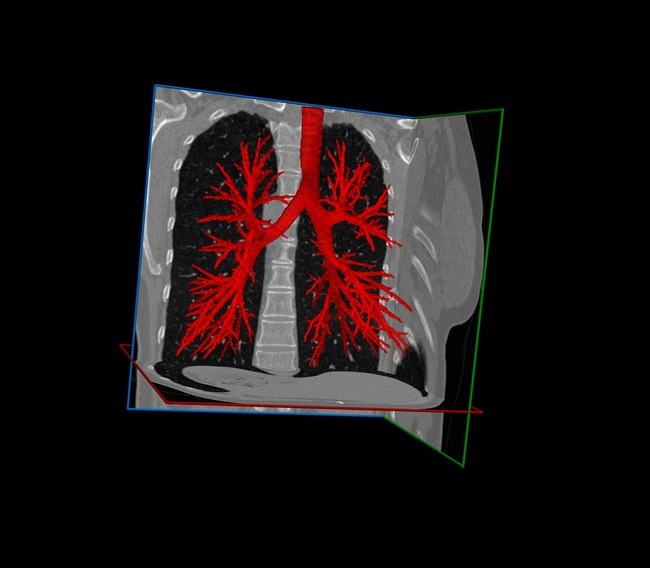RSIP Vision, a global leader in artificial intelligence (AI), computer vision, and image processing technology, has announced the release of an advanced AI lung segmentation module that reduces the threat of false positives in biopsies.

Image: RSIP Vision has announced the release of an advanced AI lung segmentation module. Photo: courtesy of PRNewsfoto / RSIP Vision.
The new solution helps refine a common yet intricate procedure in which mistakes are easily made by delivering superior mapping of even the smallest airways, ensuring that surgeons navigate to precise locations and biopsy the correct area. By optimizing navigation and providing the clearest possible view of the lungs, the AI module enables more accurate results with minimal intervention, while avoiding damage to the border of the lungs as well.
Radiologists generally perform CT scans when lungs lesions are suspected, and surgeons often recommend biopsies after reviewing the results. RSIP Vision’s AI module uses sophisticated segmentation algorithms and computer vision to divide scanned images into clusters of pixels according to their characteristics. Precise segmentation makes it easier to extract reliable data and pinpoint specific points and boundaries in images—which helps surgeons navigate through lung procedures with greater accuracy. Using bronchoscopy, surgeons can approach lesions through the trachea and perform biopsies with minimal intervention.
“From the Radiology point of view, this new AI module is becoming an increasingly helpful tool, especially in detecting small peripheral or very proximal lung lesions, that could be of clinical importance and might be missed without it. Eventually, improving the clinical outcome and maximizing the multidisciplinary workflow in the daily practice,” says Dr Rabeeh Fares, Senior resident in Tel Aviv Medical Center.
The lung segmentation module is the latest in a series of advanced solutions that RSIP Vision develops based on advanced AI segmentation and computer vision technologies. The modules are integrated into the software environments of medical devices to enhance their capabilities and outcomes in various fields, including orthopedics and cardiology as well as pulmonology. The AI modules add value to these vendor offerings by solving complex technological challenges, ensuring greater precision, shorter time to market, and lower costs.
“We’re offering this technology to the medical device industry as an absolutely necessary solution for navigation,” RSIP Vision founder and CEO Ron Soferman says. “Today we’re seeing new players in the market using advanced technologies, sometimes with robotic assistance and infrastructure. For them, as for everyone in the industry, having the best possible airway segmentation is a vital element in the success of any procedure.”
He adds that in the future, AI segmentation technology could potentially assist with navigation through other interventional procedures, such as lesion ablations, for example.
“As a pulmonologist, it is clear that during a bronchoscopy procedure, navigating the bronchoscopy into the periphery of the lung is not easy, in part because of narrowing down of the airways as we proceed distally which makes manipulation with the device very complicate and may be harmful to the surrounding lung parenchyma, and in part because the pulmonologist is not provided with accurate tridimendional “road map” to reach the lesion which enforces him to apply multiple “blind piercings” in attempt to get a successful biopsy-.
“This might cause negative diagnosis and a lot of unnecessary damage to the lung parenchyma with all the sequels. All this makes RSIP Vision`s solution mandatory to decrease the number and extension of false attempts and thereby saves time and money by avoiding complementary diagnostic procedures and unnecessary hospitalization and treatment,” says Dr. Yehuda Schwarz, Director; The Pulmonary Institute, Tel Aviv Medical Center, Tel Aviv.
RSIP Vision is a global leader in artificial intelligence, computer vision, and image processing technology. The company draws on a depth of knowledge and experience to provide customized services, sophisticated algorithms, and deep learning technology to businesses of all kinds, most notably medical devices, pharmaceuticals, and autonomous driving.
Source: Company Press Release
